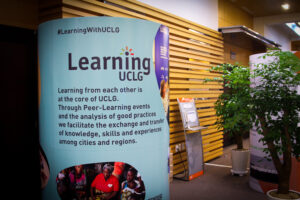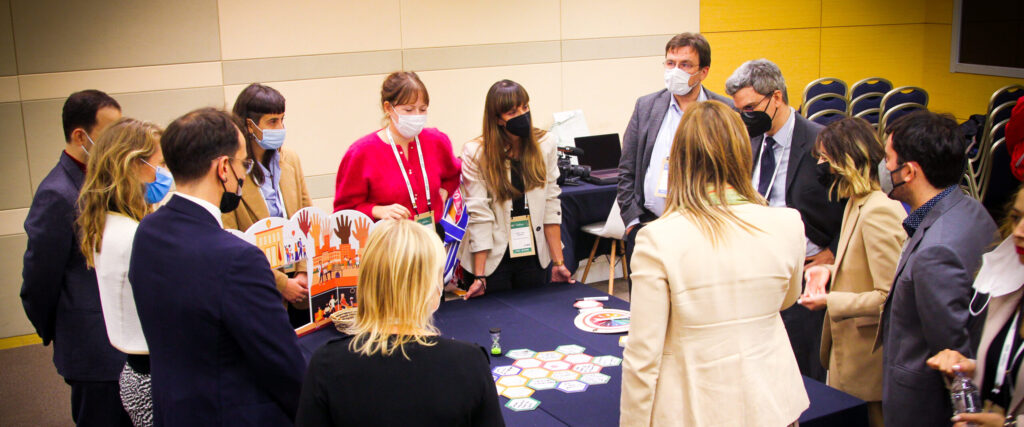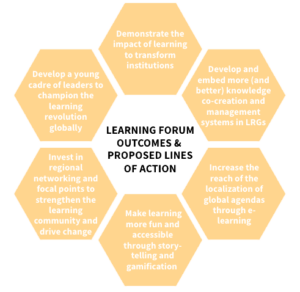 During the last decade, United Cities and Local Governments (UCLG) has been incrementally and organically unfolding its learning agenda, evolving from a commitment of members involved in generating needs-based learning projects towards a learning system that allows cities and regions to join and shape both learning demands and offers in a collaborative way on issues that matter to them and that respond to global trends and challenges.
During the last decade, United Cities and Local Governments (UCLG) has been incrementally and organically unfolding its learning agenda, evolving from a commitment of members involved in generating needs-based learning projects towards a learning system that allows cities and regions to join and shape both learning demands and offers in a collaborative way on issues that matter to them and that respond to global trends and challenges.
In the formative years of building a renewed learning agenda, UCLG has focused on globally increasing peer learning, emphasizing the sustained sharing of experiences; while building on and celebrating good practices through the diverse awards that recognized local achievement in culture, democracy, peace and innovation, and thus further increasing global visibility. Moreover, UCLG began applying networking concepts, shifting attention on the active building of existing learning initiatives rather than creating new ones and fostering a renewed focus on learning methodologies.
The development, implementation and outcome of this Learning Agenda is rooted in the potential of a consolidated network around local knowledge and learning opportunities. This collective effort of local practitioners, facilitators and partners have contributed to build and strengthen a learning community that gathers in different activities and processes and that are key and active members of key spaces such as the UCLG Learning Forum. With this Forum UCLG aims to foster and develop their skills for them to continue their role as global learning activists, connecting people and ideas and communicating global agendas effectively at the local level.

Learning Forum outcomes and proposed lines of actions
The 5th edition of the UCLG Learning Forum took place on October 11th, 2022, within the UCLG World Congress held in Daejeon, South Korea. Members, networks, associations and partners gathered together in a full-day session to share learning methodologies and capacity-building strategies, reflect on existing needs and opportunities, as well as to collectively build the future UCLG Learning agenda in alignment with the UCLG Pact for the Future.

In the months leading up to the Learning Forum in Daejeon, more than 200 representatives of LRGs, LRGAs and partners, participated in three online stocktaking sessions on (i) peer learning methodologies, (ii) localization of global agendas, and (iii) e-learning methodologies. Moreover, a survey was sent to the participants, revealing the need and interest for building skills to embed and facilitate learning into the work routine of LRGs, LRGAs and partners.
As outcomes and part of the process of collective evolution, the following interrelated issues were raised as important points of reflection to move the Learning Agenda forward with 6 proposed areas of action:
1. Demonstrate the impact of learning in order to transform institutions
Whilst immense progress has been made over the last decade, LGRs are keen to explore how to ensure that their investment in peer learning yields results in actually transforming institutions to deliver on their developmental mandates. UCLG reaffirms the need to be able to track and maximize the impact of learning activities. The ambition is to “normalize” peer learning as a modality of development cooperation, that needs to evolve strategies to involve and change institutions, and the consequent adaptation of current result frameworks that are used in cooperation agreement, in particular making change management more recognized and measurable. As a way forward, UCLG Learning will ensure to foster key partnerships with specialized institutions.
2. Develop and embed more (and better) knowledge co-creation and management systems in LRGs
Lifelong learning as public officers, the need to reskilling and upskilling it in the LRGs’ workforce and the need to use it to solve specific and unique problems in a particular LRG context were critical points raised during the Learning Forum. This discussion brings an important entry point for the learning agenda to focus on fostering the knowledge co-creation and management strategies at the local and regional level. Also as part of this approach to be embedded in municipalities, it is necessary to develop a renewed culture of active participation in sharing and transferring knowledge, induction of new staff members and the translation of tacit into explicit knowledge, with the aim of enabling practitioners to become reflective, their work meaningful and ultimately able to contribute towards building better living environments. Thus, the learning agenda will give more importance to embedding KM systems at a local level in LRGs, where practitioners are made aware of the importance of creating, organizing, documenting, sharing and storing knowledge. Further, it will raise awareness that the staffers of LRGs have the right to lifelong learning, and this should not be limited to skill updating. Innovative formats like open government will require effective teams, not only in terms of deliverables and administration, but also in terms of ultimate service provision to communities. Finally, a new strategy could work in providing guidance on how LRGs can work better with academia/universities/research centers to maximize local impact, as part of this integrated KM approach.
3. Increase the reach of the localization of global agendas through e-learning
Another critical area emerging not only from the reflections by the learning community, but raised at the Learning Forum plenary is that, whilst great strides have been made with the regional sections in localizing the global agenda, greater effort to increase global reach and awareness must be made. As a way forward, attention must be given to how to effectively harness the power of online learning with the development of new formats such as “Live Learning Sessions” and “Massive Open Online Courses” to provide opportunities for the newcomers.
4. Make learning more fun and accessible through story-telling and gamification
Key debates taking place during the Forum and out of the different activities developed by the UCLG Learning Team in the last years have brought the importance of examining the relationship between training and learning: the extent to which training incentivizes learning, how training can be improved so that learning is maximized, with a renewed focus on innovative ways to deliver training content so that it is more practical, more playful and ultimately more effective. In this line, consensus from the entire UCLG community was reached on the power of storytelling, and the value of gamification as learning assets. These tools have proven to be critical to raise a more durable attention, that is needed when real learning is to take place. As part of the strategy, UCLG will keep on inspiring practitioners to rethink their approach to methods of training and sharing knowledge in a way that maximizes impact respectively, using games as part of its blended learning methodology and re-emphasizing its value while exploring new tools.
5. Invest in regional networking and focal points to strengthen the learning community and drive change
The role of Regional Sections and focal points as catalysts for change through their leadership in their respective regions was reiterated. During the Congress various sessions had the benefit of listening to cities and regions share innovative practice for the first time on the global stage. This revealed the gap of needing to invest in energy, time and capacity of the sections, as well as the members to intensify documenting and sharing of good practice regionally and globally. The focal point’s role in tailor-making training programmes for their context was also seen as a key learning area for action. Focal points are appreciated, but they need to update skills. The learning forum community could enhance in particular technical leadership of networks, communities of practice and local for action hub managers.
6. Develop a young cadre of leaders to champion the learning revolution globally
The sixth proposed line of action is to begin a process to mobilize a new cohort of young people who will lead the UCLG Learning revolution globally. This is not only to leave no one behind but to appreciate leadership and innovation. As the general UCLG strategy is being built on inclusive dialogues and listening exercises, motivating and coaching youth counselors could be a possible format.
Some of the masterclasses, learning products and methodologies shared during the Learning Forum pointed towards concrete actions already underway and opportunities to advance in this direction, and we look forward to continue collaborating with our network moving forwards. Do not hesitate to reach out if you have any input or suggestions that can contribute to the UCLG Learning agenda for the Future of People, Planet, and Government!